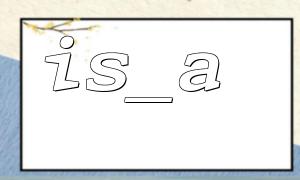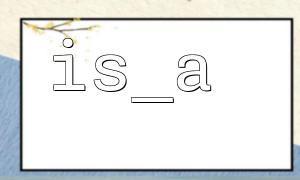In PHP, the is_a() function is used to determine whether an object is an instance of a class, or whether it is inherited from that class. If used improperly, errors or warnings may be raised, especially in stricter mode or newer versions of PHP, where parameters are more stringent.
The basic syntax of the is_a() function is as follows:
is_a(object|string $object_or_class, string $class, bool $allow_string = false): bool
The first parameter of this function can be an object or a class name string (when the third parameter $allow_string is true ). The second parameter must be a string of the class name.
A common mistake many developers make when using is_a() is to mistakenly write the second parameter as an object , or forget to pass in the class name string at all, especially when dynamically generating parameters.
For example:
$object = new SomeClass();
if (is_a($object, $someClassInstance)) {
// This will cause an error,Because the second parameter is not a string
}
This writing method will trigger TypeError in PHP 8, because the second parameter must be a string, not an object. The correct way to do this is to make sure that the class name string is passed in:
$object = new SomeClass();
if (is_a($object, get_class($someClassInstance))) {
// correct,get_class() Return the class name string
}
Many people may write the following code when calling the object type returned by a third-party interface to judge:
$response = get_data_from_api('https://m66.net/api/example');
if (is_a($response, $expectedClass)) {
// Do some processing
}
The problem here is that if $expectedClass is an object instead of a class name string, it will also report an error. You need to do a check or cast first:
if (is_object($expectedClass)) {
$expectedClass = get_class($expectedClass);
}
if (is_a($response, $expectedClass)) {
// Handle it safely
}
In most scenarios where an object belongs to a certain class or its subclass, it is actually more recommended to use the instanceof operator:
if ($object instanceof SomeClass) {
// Recommended writing,More intuitive
}
But if the class name is dynamic (for example, read from a configuration file), is_a() is a more suitable choice:
$className = 'App\\Models\\User';
if (is_a($object, $className)) {
// Dynamically determine object types
}
When using is_a() , be sure to confirm that the second parameter is a class name string, not an object. If your parameters may be objects, first convert them via get_class() . In addition, for static judgments, the use of instanceof is preferred, so the code is clearer and less prone to errors. Mastering these details can effectively avoid some common PHP traps and improve the robustness and maintainability of the code.














